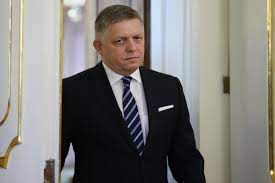
Slovakia’s new government, led by populist Prime Minister Robert Fico who ended the country’s military aid for Ukraine, won a mandatory confidence vote in Parliament on Tuesday.
Of the 143 lawmakers present in the 150-seat Parliament, 78 voted in favor of the three-party coalition government that was sworn in on Oct 25.
Fico returned to power and took over as prime minister for the fourth time after his scandal-tainted leftist Smer, or Direction, party won Slovakia’s Sept 30 parliamentary election on a pro-Russian and anti-American platform.
Fico’s victory may mark a dramatic turnaround in the country’s foreign policy and could strain a fragile unity in the European Union and NATO.
Slovakia, a country of 5.5 million people that shares a border with Ukraine, had been a staunch supporter of Kyiv since Russia invaded in February last year, donating arms and opening its borders for refugees fleeing the war.
Fico has stopped the military aid. He also opposes EU sanctions on Russia and wants to block Ukraine from joining NATO.
Fico’s critics worry that his return to power could lead Slovakia to abandon its pro-Western course in other ways, following the example of Hungary under Prime Minister Viktor Orbán.
Fico vowed to pursue a “sovereign” foreign policy, promised a tough stance against migration and non-governmental organizations and campaigned against LGBTQ+ rights.
After the vote, the Health Ministry announced it was planning to cancel a regulation adopted by the previous government that has simplified the process of sex changes. After two gay men were shot dead in October last year outside a bar popular with the LGBTQ+ community in the capital of Bratislava, the community asked for the simplified process.
On corruption, some elite investigators and police officials who deal with such cases have been ordered to stay at home or dismissed, and the government plans to ease punishment for corruption, among other changes in the legal system.
Since the previous government took power in 2020 after campaigning on an anti-corruption ticket, dozens of senior officials, police officers, judges, prosecutors, politicians and businesspeople linked to Smer have been charged and convicted of corruption and other crimes. The cases of a number of others have not been completed yet.
Fico himself and his former Interior Minister Robert Kalinak faced criminal charges last year for creating a criminal group and misuse of power. Kalinak is the defense minister in the new government.
Known for his tirades against journalists, Fico labeled a major television network, two nationwide newspapers and an online news website his enemies and said he won’t communicate with them.






